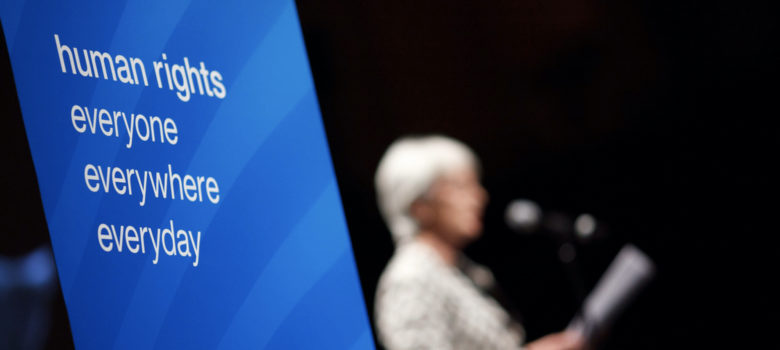The Bell coalition website blocking plan may violate more than just Canadian net neutrality rules. As currently framed, it may also violate human rights norms. Website blocking or other measures to limit access to the Internet raises obvious freedom of expression concerns that has sparked commentary from many international governmental organizations. Frank LaRue, the former U.N. Rapporteur on Freedom of Expression, was one of several experts on freedom of expression, including representatives from the Organization for Security and Co-operation in Europe, the Organization of American States, and the African Commission on Human and Peoples’ Rights, who issued a joint declaration in 2011 on freedom of expression and the Internet. It states the following on blocking:
Mandatory blocking of entire websites, IP addresses, ports, network protocols or types of uses (such as social networking) is an extreme measure – analogous to banning a newspaper or broadcaster – which can only be justified in accordance with international standards, for example where necessary to protect children against sexual abuse.
As discussed earlier in this series, the Bell coalition proposal is inconsistent with international standards given the absence of a court order for such an “extreme measure.” In 2012, a further declaration from LaRue and the IACHR-OAS Special Rapporteur on Freedom of Expression states:
all restrictions on freedom of expression, including those that affect speech on the Internet, should be clearly and precisely established by law, proportionate to the legitimate aims pursued, and based on a judicial determination in adversarial proceedings. In this regard, legislation regulating the Internet should not contain vague and sweeping definitions or disproportionately affect legitimate websites and services.
Once again the Bell coalition proposal falls short, both with respect to proportionality and in the absence of a judicial determination. In fact, last year, Stanford University researchers conducted an extensive review of website blocking within the context of human rights, reaching the following conclusion:
OAS countries would likely violate their human rights obligations if they held intermediaries liable for failing to block entire sites or services in cases where no court order has been issued, as this might characterize an indirect interference on freedom of expression, prohibited by Article 13, 3 of the ACHR.
Moreover, in most cases the judiciary is the best-equipped institution to determine whether the particular content at issue has actually violated the law, as well as whether these measures are a necessary, proportionate, and an appropriate response. In states that do not require judicial authorization for SSB [site and service blocking], government actors and ISPs may be able to block content directly without the judiciary’s legal analysis or oversight.
The Council of Europe’s 2017 comparative study on blocking, filtering, and take-down of illegal Internet content raises many of the same concerns. In relation to copyright related blocking, it cites to an OSCE report:
It is recalled that the courts of law are the guarantors of justice which have a fundamental role to play in a state governed by the rule of law. In the absence of a valid legal basis the issuing of blocking orders and decisions by public or private institutions other than courts of law is therefore inherently problematic from a human rights perspective. Even provided that a legal basis exists for blocking access to websites, any interference must be proportionate to the legitimate objective pursued.
International human rights rules and declarations leave the Bell coalition website blocking plan vulnerable to challenge in at least two respects. First, the absence of court orders remains a fatal flaw, placing Canada at odds with virtually every country in the world that has adopted any form of copyright-related website blocking. Given the lack of court orders and the implications for freedom of expression, it is unsurprising that the Bell coalition website blocking plan is opposed by every major civil liberties group in Canada including the Canadian Civil Liberties Association, the B.C. Civil Liberties Association, the Rocky Mountain Civil Liberties Association, and Canadian Journalists for Freedom of Expression.
Second, the proportionality of the measures relative to harm also leaves it subject to challenge. As previously noted, there is only weak evidence on state of Canadian piracy and the claims of harm. Even if the harm is accepted, it must be set out against the likelihood of overblocking, violating net neutrality rules, and its ineffectiveness as an anti-piracy solution. Courts in other countries have ruled that blocking systems may be disproportionate (Greece, the Netherlands). The Council of Europe report notes that “lower German courts have refused to follow the ECJ’s lead because of the limited effectiveness of blocking measures, which might be a problem, on the level of human rights, in terms of proportionality and transfer of judicial power to ISPs.” In light of the serious flaws with the Bell coalition website blocking proposal, a similar conclusion might well be reached in Canada.








I say give them website blocking. Then make them sign up to a dozen progressively more expensive services, each offering less than the previous less expensive one… at which point they find out that what they thought they were paying to get, can’t be done on their device. Seems fair play, then we can say we are giving them what they want while in no way shape or form will they ever have bought anything of substance.
Theft is not a human right or a freedom of expression issue.
The “theft” angle is just so tired. It was debunked ages ago.
Pingback: UN Special Rapporteur for Freedom of Expression: Website Blocking Plan "Raises Serious Inconsistencies" With Canada's Human Rights Obligations - Michael Geist
Pingback: This Week’s [in]Security – Issue 49 - Control Gap | Control Gap